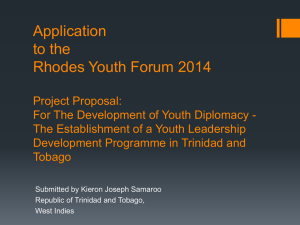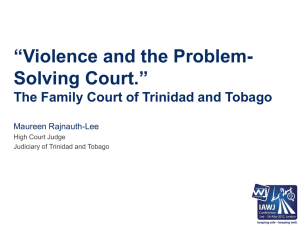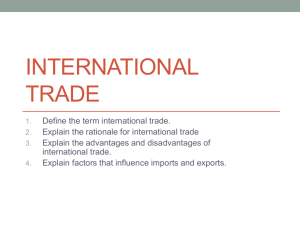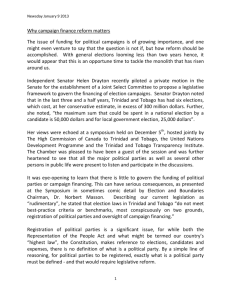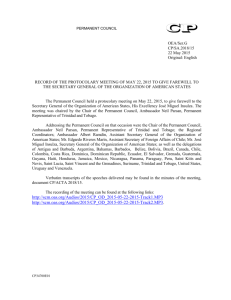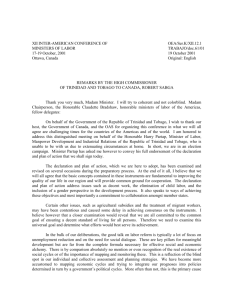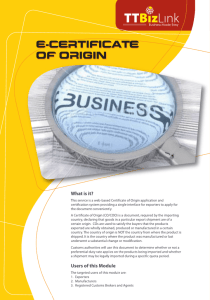L A C F
advertisement
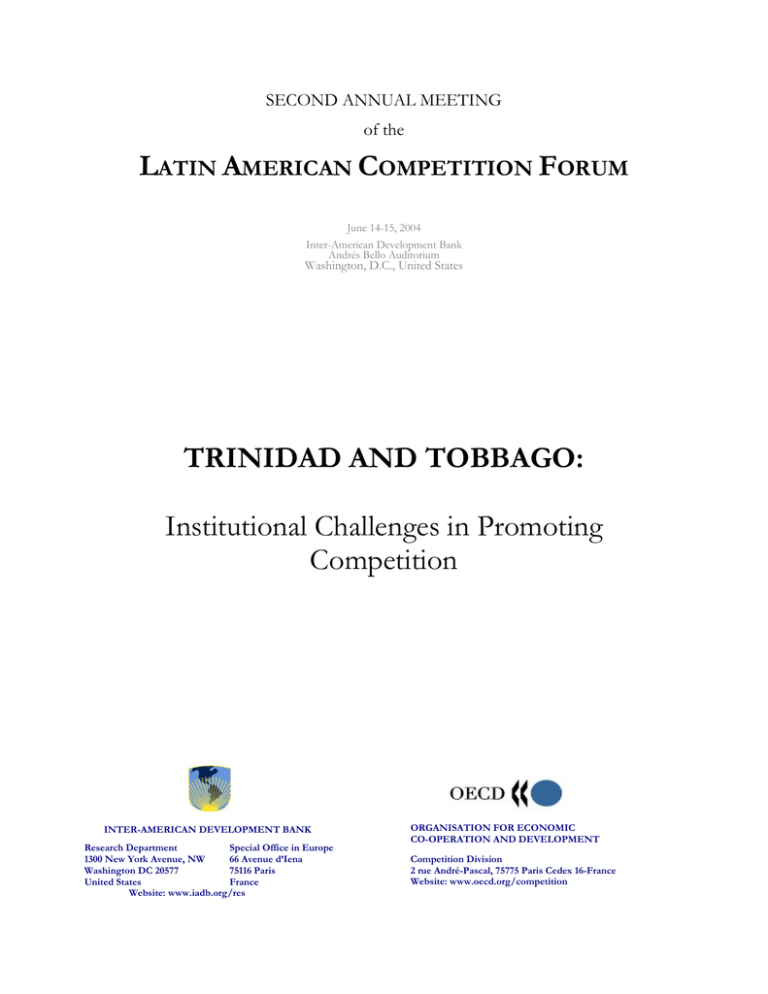
SECOND ANNUAL MEETING of the LATIN AMERICAN COMPETITION FORUM June 14-15, 2004 Inter-American Development Bank Andrés Bello Auditorium Washington, D.C., United States TRINIDAD AND TOBBAGO: Institutional Challenges in Promoting Competition INTER-AMERICAN DEVELOPMENT BANK Special Office in Europe Research Department 66 Avenue d’Iena 1300 New York Avenue, NW 75116 Paris Washington DC 20577 France United States Website: www.iadb.org/res ORGANISATION FOR ECONOMIC CO-OPERATION AND DEVELOPMENT Competition Division 2 rue André-Pascal, 75775 Paris Cedex 16-France Website: www.oecd.org/competition Introducing Competition Law and Policy in Trinidad and Tobago: Some Institutional Challenges Introduction 1. In 1997 the Government of Trinidad and Tobago issued a Green Paper proposing the introduction of a competition law and policy regime. The competition regime is not yet in force and the government is currently considering the second draft of the legislation, which, it is hoped, will be enacted later this year. The Green Paper is still regarded as the government’s policy for a future competition regime and contains the proposals that inform the current draft of legislation, which will be entitled the Fair Trading Act. The Green Paper made recommendations for the establishment of certain institutions. In this regard, the Act would establish a Fair Trading Commission that would be staffed by a full-time Chairman and not less than four part-time members to be appointed by the President of Trinidad and Tobago. In addition the Act would establish a Fair Trading Court, referred to as the Tribunal in the current version of the legislation, which will be a division of the High Court, consisting of a judge and 2 expert laymen. 2. Certain aspects of the Green Paper as they pertain to future institutional challenges will be examined in this paper. It will be argued that the competition authority -the Fair Trade Commission, hereafter the Commission- will necessarily have to begin its work with a program of competition advocacy before the enforcement aspect of the Act comes into force. This is because the proposed competition legislation will introduce a new ethos in business transactions and will affect how the government implements decisions of an economic nature. It will therefore require that the officials of the competition authority have adequate prior training for the purpose of implementing the provisions of the Act and carrying out public education campaigns. In this connection, before the competition legislation is enacted, the Trinidad and Tobago public must be made aware of the new demands of the competition policy and law in a society that does not have a culture or history of competition regulation. Equally important will be the task of working out beforehand the lines of functional jurisdiction between the Regulated Industries Commission and the Commission. 3. It is probably safe to say that the current business climate in Trinidad and Tobago is one where there is a proliferation of activities that would be condemned as anticompetitive abuses under the proposed legislation. It is against this background that for the first time in Trinidad and Tobago, there will be legislation that seeks to: • Prevent monopolies, where they exist, from abusing their power • Prevent new monopolies from being created through mergers • Eliminate anti-competitive agreements • Provide the Government with an expert source of advice on all Trinidad and Tobago’s laws and policies having a bearing on competition. Fair Trading Commission 4. Regarding the Commission’s relationship with the government, the Green Paper only recommends that the Commission act independently of government. The Commission’s members, the Commissioners, will be appointed by the President of Trinidad and Tobago who is not an executive President and is supposed to be politically neutral. This is one way in which the Commission will be insulated from possible political influences. The current draft however provides that the Minister of Trade and Industry may request the Commission to “carry out such other investigations as may be requested” and additionally, that funding of the Commission for special purposes, may be made available by the Minister of Trade and Industry. In view of these draft provisions, it may be concluded that the Commission may not be entirely insulated from political influence. That in turn 2 raises the question of the circumstances in which political intervention will be appropriate. 5. Before the legislation comes into force, it is suggested that there be a cadre of personnel adequately trained and qualified in competition law and policy who will be available to staff the Commission and the Tribunal and to carry out in a competent manner the functions of both organizations. The concepts of competition policy and law will be new and complex; new enforcement procedures and techniques will have to be learnt. Once the Act comes into force, one will reasonably expect that there will be a smooth implementation of its provisions. That expectation will be fulfilled only if the Commission staff is already trained in applying the provisions of the Act. This approach to training was adopted when Trinidad and Tobago introduced WTO-compliant antidumping legislation in 1995. At the time the Ministry of Trade and Industry sent several officers abroad to various agencies to be trained in the specific anti-dumping enforcement procedures that were required by the legislation and that training took place well before the legislation was introduced. 6. Personnel to be selected for training ought not to be difficult to locate. Officials of the Ministry of Trade and Industry, where the initial work of locating foreign competition consultants and preparing the policy was done, are a likely source. However, the net can be cast among other Ministries (the Attorney General department, the Ministry of Finance, the Ministry of Public Utilities, and the Ministry of Consumer Affairs) and academia e.g. the University of the West Indies. Having undergone the necessary training, those personnel must be retained as staff for the Commission and the Tribunal. The importance of doing so is seen in the experience of having local personnel trained abroad to administer the domestic anti-dumping legislation. Fairly shortly after returning, the majority of those trained persons chose not to continue in the field in which they were trained. The value of training was therefore lost perhaps because sufficient incentives were not created to retain those persons. 3 7. Under normal circumstances, the enactment of legislation would bring into force all of its provisions simultaneously. Perhaps, in this case, in order to establish a Commission that would need a period of time to undertake the necessary preparatory work before entertaining complaints and conducting investigations, the legislation could schedule at different times the enactment of different sections, commencing with the establishment of the Commission and its advocacy functions, following up after a scheduled period with other provisions that deal with the establishment of the Tribunal and shortly thereafter the enforcement functions of the Commission. 8. Once it is duly staffed, the Commission should embark upon a campaign of competition advocacy that would raise public awareness of the benefits of the new competition regime. In point of fact, one aspect of the awareness program would have already taken place, that is, the public consultations on the draft competition bill that would have been undertaken by the Ministry of Trade and Industry. Such consultations are very important as they produce useful suggestions and modifications that could be incorporated in the draft bill. Moreover, they assist in shaping the legislation to suit the special features of a small island developing country. Previous efforts by the Ministry of Trade and Industry in 1998 to conduct public consultations on the Green Paper on competition were only partially successful. While several government departments and state agencies did respond, it is interesting to note that the most important stakeholder in the process- the business community- chose not to respond and stayed away from the consultation sessions. The local Manufacturers’ Association however has informed the Ministry recently that their comments on the current version of the draft competition bill will be forthcoming. One suspects that on this occasion the private sector will be more responsive to such a process. 9. Competition Advocacy 4 The concept of competition advocacy is explained by The Advocacy Working Group of the International Competition Network as “those activities conducted by the competition authority related to the promotion of a competitive environment for economic activities, by means of non-enforcement mechanisms mainly through its relationships with other governmental entities and by increasing public awareness of the benefits of competition.” In the decade of the nineties, successive governments in Trinidad and Tobago pursued a program of structural adjustment, trade liberalization, economic reform and liberalization, including the privatization of certain state enterprises, which has resulted in the growth of the non-oil sector of the economy. The Government’s current economic program has targeted the small business sector in Trinidad and Tobago for intensified development. That effort is currently occurring in a liberalized and deregulated environment, where in the absence of competition policy and law, the monopolistic power of privatized state enterprises and other firms enjoying dominant positions is amplified. Competition advocacy is therefore essential for the effective application and adoption of a competition culture in any country where private anti-competitive conduct or state intervention in the economy predominate. 10. Although the Green Paper does not fully develop the role that competition advocacy will play under the new regime, the current version of the Act does state that the Commission as part of its functions shall: a. make available to persons engaged in business, general information with respect to their rights and obligations under the Act; b. make available general information for the guidance of consumers with respect to the rights and obligations of persons under the Act affecting the interests of consumers; c. co-operate with and assist any association or body of persons in developing and promoting the observance of standards of conduct for the purpose of ensuring compliance with the provisions of the Act. 5 To ensure that competition advocacy is aimed at all important stakeholders in the society, the Commission should have as one of its target groups, government officials, including the judiciary. The government is a major actor in the economy and its decisions and the mode of applying decisions can have a profound effect on the competition environment. 11. The Commission could occupy itself initially with the development of strategies to raise public awareness and support for a competition regime in Trinidad and Tobago. That could be achieved via the following: • educational seminars on competition policy and law for government officials, including the judiciary, and officials of state enterprises, as well as for businessmen and consumers; • seminars and workshops at the University of the West Indies to stimulate academic discussion of competition issues in the local setting; • development of legal commentary on the rules of competition law and policy; • programs to increase the awareness of government officials of the need for market institutions and how markets are supposed to operate; • discussion in specialized forums on the role of competition law and policy in good corporate governance; • creation of public awareness of and the promotion of a competition culture through the dissemination of information on the web, the media, the publication of pamphlets, brochures and booklets. 12. Fair Trading Tribunal In the assignment of functions for the Commission, the Green Paper characterizes that body as a quasi-judicial body that will have order-making powers that will range from orders to prohibit an agreement from being concluded to orders to prohibit the acquisition of another company. The Green Paper also states that the 6 Commission will “initiate proceedings under the Act” and “will pursue its work through investigations.” The issue then arises whether the assignment of both the investigative and adjudicative functions in the legislation to one entity would be in breach of the basic rules of natural justice. It is suggested here that the final version of the legislation address this particular problem by possibly placing the enforcement function in the Tribunal and not the Commission. 13. The Fair Trading Tribunal, the other competition institution envisaged by the Green Paper, is assigned the function of hearing appeals from the Commission and receiving applications from the Commission to impose penalties lying outside the Commission’s own powers. It will also receive appeals from the Regulated Industries Commission that is responsible for licensing and setting standards for domestic service providers. The current version of the Bill allows appeals from the Fair Trading Tribunal to the domestic Court of Appeal. 14. The judicial officials of the Tribunal and indeed the Court of Appeal will need prior training in competition policy and law and should participate in competition advocacy programs before the Tribunal begins its work. As an example of the need for education when a new regulatory regime is introduced, it can be safely said that the local judiciary’s unfamiliarity with the domestic trade remedy regime has led to decisions that tend to weaken the enforcement of the domestic antidumping legislation. 15. Regulated Industries Commission The public utilities sector in Trinidad and Tobago had undergone a program of commercialization and privatization during the decade of the nineties and a new regulatory framework for public utilities was subsequently adopted. The Regulated Industries Commission was created in 2001 and the parent Act among other things, confers on the President of Trinidad and Tobago, the power to issue licenses to providers of utility services, with the explicit aim of fostering competition. 7 Under the proposed regime, competition law will apply to the public utilities in the same way as to all other sectors of the economy. The Green Paper indicates that it would not make for good administration if public utilities were to be subject to regulatory intervention by both the Commission and the Regulated Industries Commission, as this would create confusion and role conflict. The enforcement function for both competition and regulation will therefore be assigned to the Regulated Industries Commission. The Commission will not deal with public utilities. It will be therefore important to ensure consistency in the work of the 2 Commissions. Therefore both Commissions should have one or more members in common. As noted before, an appeal from the decisions of both Commissions will be made to Fair Trading Tribunal. 16. The Regulated Industries Commission, (RIC), in its role as regulator, and in the absence of competition policy, has found itself making a decision recently on a new issue in telecommunications that could have future implications for competition in that sector. In that sector, technological innovation has begun to transform the monopoly aspect of telecommunications as Internet service providers, using Voice over Internet Protocol, are currently providing overseas calls at much lower rates than the monopoly telephone company. The legislation granting the telephone service monopoly however does not apply to Voice over Internet Protocol however the RIC has interpreted the legislation to require internet service providers offering that service to be licensed under the RIC legislation. One could characterize the RIC’s decision as conservative and promonopoly. It is submitted that that decision might possibly have been different if the RIC were exposed to the benefits of a competition advocacy program. 17. The RIC’s decision in the telephone monopoly case mentioned above was made in the absence of a competition agency. If there were a competition agency, the issue of jurisdiction between the RIC and the competition agency would have had to be worked out in the case under consideration, since the issue pits consumer interests and new competitors using a different technology against a firm enjoying 8 a pre-existing monopoly. The relevant legislation should provide assistance in the matter of the division of labour but it might in fact be less useful if the functions of both agencies turn out to be very similar. 18. The foregoing is an examination of some of the challenges that will be faced in establishing and operating competition institutions in Trinidad and Tobago, in this case, the Fair Trading Commission and the Fair trading Tribunal. It is submitted that those challenges could be met successfully if the local environment has been sufficiently prepared by programs of competition advocacy. 9
